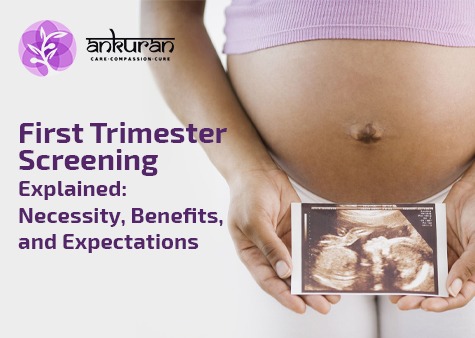One of the first steps in the pregnancy journey is the first-trimester screening. This early-stage test is crucial for identifying potential health issues. It’s a combination of blood tests and ultrasound, like the early pregnancy scan, done within the first 11 to 13 weeks.
The first-trimester screening scan can provide insights into conditions like chromosomal or congenital defects. Early detection of such conditions is critical for the well-being of both mother and baby.
So, let’s delve into the importance of these screenings on your pregnancy journey.
Understanding First Trimester Screening
The first-trimester screening is an early pregnancy test. It’s done within the first 11 to 13 weeks of pregnancy. This screening helps identify potential health issues in the baby. Due to the early timing of the test, it is frequently utilized to assess whether a mother should contemplate undergoing an early diagnostic test, such as chorionic villus sampling or amniocentesis in the second trimester.
How is the First Trimester Screening Test done?
The first-trimester screening test is a two-part examination: a blood test and an ultrasound scan.
The Blood Test
The blood test is typically done at a lab. A small quantity of blood will be gently drawn from your arm by a medical professional. This blood sample will be tested for specific markers that could indicate a higher risk of certain chromosomal abnormalities in the baby.
All pregnant women’s blood contains a pair of substances. These substances are measured by blood tests:
- Pregnancy-associated plasma protein-A (PAPP-A): The placenta produces this protein during the early stages of pregnancy. Unusual levels may indicate a higher likelihood of a chromosome defect.
- Human Chorionic Gonadotropin (hCG): The placenta also produces this hormone in the early stages of pregnancy. Elevated levels may indicate a higher likelihood of a chromosome abnormality.
The Ultrasound Scan
A trained sonographer performs the ultrasound scan, also known as a nuchal translucency scan. During the scan, you’ll lie down while the sonographer applies a special gel to your abdomen. They’ll then use a device called a transducer to send sound waves into your uterus. These sound waves bounce back to create an image of your baby. The sonographer will measure the thickness of the fluid at the back of your baby’s neck. An increased thickness can indicate a higher risk of various chromosomal conditions.
Trained operators can also see on this scan other markers for aneuploidies and adverse pregnancy outcomes like Tricuspid regurgitation and Ductus Venosus Dopplers, which are 2 important blood flows in your baby. In addition to that, an assessment of the baby’s growing anatomical structures can be done in this scan to rule out at least 9 major congenital anomalies like anencephaly (a missing brain), acrania (a missing head), megacystis (a big bladder) etc. An experienced fetal medicine specialist can also do a cervical length screening( measuring the length of the neck of your womb to check if you are at risk of having a premature delivery later).
Why is the First Trimester Screening Scan done?
The first-trimester screening scan is performed between 11 and 13 weeks of pregnancy. This scan evaluates the amount of fluid in the region at the back of the baby’s neck to check if it might have any birth defects. Increased fluid can be an early sign of conditions like Down syndrome, Edward syndrome and Trisomy 18 or birth defects such as congenital heart defects.
For infants who may be more prone to chromosomal abnormalities, it is not uncommon to observe higher levels of fluid in the nuchal translucency. Abnormal levels of hCG and PAPP-A are also frequently observed. These parameters (nuchal translucency, hCG, and PAPP-A) are combined with maternal age risk factors to establish an overall likelihood of chromosomal abnormalities in the first-trimester screen.
The screening test is usually provided to women in the later stages of the first trimester. Women at higher risk, such as those who are over 35, may be given the option for a cell-free fetal DNA scan. These screening tests may not provide accurate results for women who are expecting multiple pregnancies (twins or more). However, this scan is just a screening tool. It can only tell us if your baby has a higher risk of certain conditions. It cannot diagnose these conditions.
What Do the Results Mean in an FTS Pregnancy Test?
It is crucial to remember that the first-trimester screen is an assessment test and not a diagnostic test. This test only indicates that a mother may carry a child with a genetic disease. It is not uncommon for women to receive false positive results on certain tests, leading to unnecessary concern.
You won’t be provided with precise numerical values for each component of the First Trimester screen. Instead, you will receive information about whether your results fall within the normal range or if they are abnormal. Additionally, your genetic counsellor will provide you with a risk-level assessment. Based on the test results, the counsellor will inform you of the likelihood of developing chromosomal abnormalities (for instance, 1/250, 1/1300).
Further testing is necessary to make a diagnosis when test results are abnormal. A genetic counsellor will review the results with you and help you make informed decisions regarding diagnostic tests, such as CVS or amniocentesis. It is important to thoroughly discuss these invasive procedures with your healthcare provider and your partner. Further counselling could be beneficial.
The Importance of the First Trimester Screening Scan
Embarking on the journey of pregnancy brings a mix of emotions and a multitude of questions. One key aspect of this journey is the first-trimester screening. This early-stage test is an important part of fetal medicine, giving you integral insight into the condition of the fetus.
The first-trimester screening test can detect 4 out of 5 newborns with trisomy 18, and 5 out of 6 babies with Down syndrome.
Down syndrome, also known as trisomy 21, is the result of an additional chromosome during fetal development. It can lead to cognitive impairment and severe cardiovascular issues. Approximately 1 in every 600 newborns is diagnosed with Down syndrome. While the occurrence of having a baby with Down syndrome is more common among women of advanced age, it is important to note that it can happen at any age.
Trisomy 18 is the result of an additional chromosome in the developing fetus. Survival to birth is rare for babies with trisomy 18. Approximately one in every 6,000 newborns is diagnosed with trisomy 18. Trisomy 18 is associated with cognitive impairment, cardiac abnormalities, severe growth restriction, and various other complications.
Contribution of FTS Pregnancy Test to the Health and Well-being of Both Mother and Baby
The first-trimester screening scan plays a significant role in ensuring the health and well-being of both mother and baby. Such as:
- Early Detection: The screening can identify potential health issues in the baby at an early stage. This allows for timely intervention and management of any chromosomal or genetic disorders such as congenital heart defects, which can significantly improve health outcomes.
- Informed Decision-Making: The results of the screening provide valuable information about the condition of the fetus (if it has a disorder or not) that can guide further medical care and decision-making during pregnancy.
- Peace of Mind: Knowing that the baby is developing normally can provide reassurance to expectant parents, reducing anxiety and stress.
- Preparation for Potential Challenges: If the First-trimester screening test results indicate a higher risk of certain conditions, parents have more time to learn about the condition, plan for any necessary treatments, and prepare emotionally for the challenges ahead.
- Guides Further Testing: If the screening results show the risk of genetic conditions like Down syndrome, Edwards syndrome, and Patau syndrome; it can guide the need for further diagnostic tests. This guarantees that you get the appropriate care exactly when you need it.
If the results of the screenings are abnormal then it can also give the opportunity for parents to do get a proper understanding of the results.
Further Testing Confirms A Diagnosis And Opens Doors:
- Look into possible solutions that could help, like fetal surgery for spina bifida.
- Plan ahead for your child’s special needs now.
- Prepare for your upcoming lifestyle shifts.
- Find local and online communities of support.
- Consider your options for bringing the pregnancy to term.
Why Choose Ankuran Clinic for First Trimester Screening
When it comes to the crucial first-trimester screening, choosing the right clinic is paramount. Ankuran Clinic, a top fertility centre in Salt Lake, Kolkata, offers a comprehensive range of services related to first-trimester screening.
At Ankuran Clinic, expectant mothers can avail of comprehensive services related to first-trimester screening. First-trimester screening test costs in Kolkata vary from clinic to clinic, however, the cost here is quite reasonable. The clinic’s experienced team ensures that the screening process is conducted smoothly, providing valuable insights into the health of your baby. Choosing Ankuran Clinic for your first-trimester screening means choosing peace of mind and quality care for both mother and baby.
Ankuran Clinic, with its state-of-the-art equipment and experienced staff, can provide various female fertility tests as well as treatments such as IVF, IUI, and ICSI treatment. Moreover, for expectant mothers, detailed fetal anomaly scans, amniocentesis in pregnancy and many more pre-natal tests are also available.
Conclusion
The first-trimester screening is a crucial part of early pregnancy. It helps identify potential health issues and provides valuable insights into your baby’s health. The benefits of this screening are numerous, from early detection of genetic disorders to showing a healthy fetus, giving to-be mothers peace of mind.
With a wide array of services related to first-trimester screening, Ankuran Clinic emerges as a ray of hope for many prospective parents. The clinic’s seasoned team guarantees a seamless screening process, delivering top-notch care for both the mother and the baby.
The first-trimester screening test is an essential step in your pregnancy journey. And with Ankuran Clinic, you’re choosing quality care, peace of mind, and a healthier pregnancy journey.



No Comments